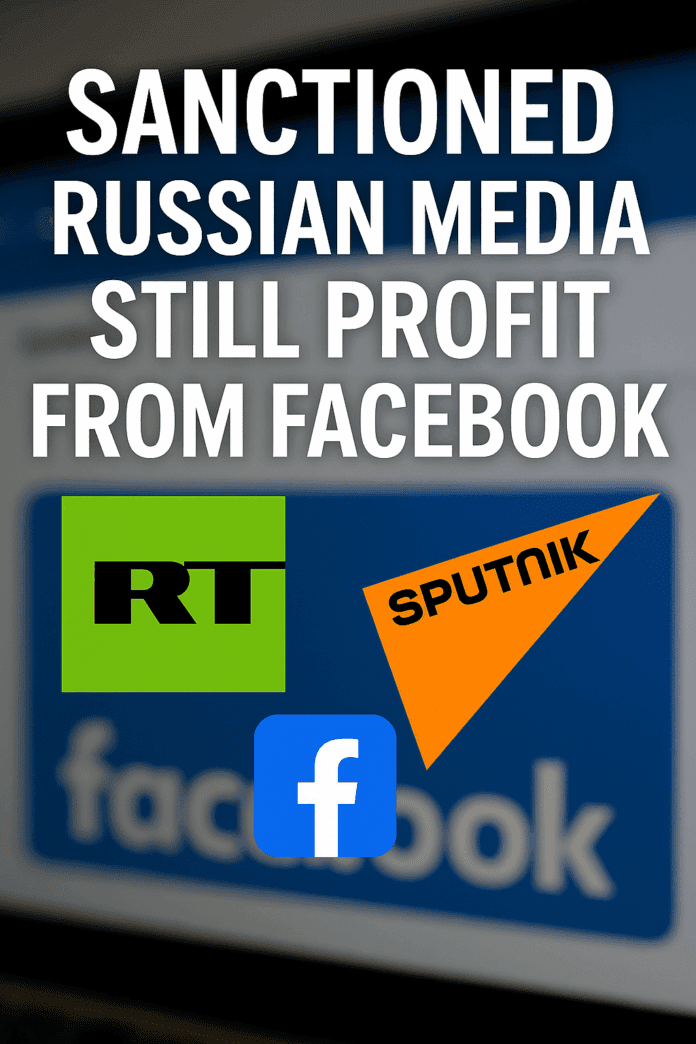Despite being under strict European Union (EU) sanctions, Russian media outlets are still finding ways to make money on Facebook.
Russian Media Still Making Money from Facebook
A recent report has revealed that channels like Russia Today (RT) and Sputnik — both state-run broadcasters — are still part of Meta’s (Facebook’s parent company) partner program. This program allows publishers to earn money from ads displayed next to their content.
The investigation was done by a group called WHAT TO FIX, a non-governmental organization that focuses on digital accountability. They found that as of June 20, 2025, several sanctioned Russian pages were still listed as eligible for advertising revenue. These include RT, Sputnik, and even individuals like Russian pop star Polina Gagarina and a known pro-Russian activist.
Even though the EU has banned these media from broadcasting and sharing content within its borders, these channels continue to operate on Facebook, especially in non-European languages like Arabic. This makes it harder for authorities to stop their reach — and their income.
Telegram’s Controversial Ban on Russian State Media Channels in Europe
Meta’s Mixed Signals and Loopholes
Meta (the owner of Facebook) responded to the report by saying just being on the partner list does not automatically mean that these accounts are earning money. According to the company, being listed does not confirm actual payments, and Meta claims it “takes action” when they discover violations of sanctions.
But WHAT TO FIX disagrees. Their report shows a pattern. For example:
RT and Sputnik were removed from the Meta partner list in 2022, after sanctions started.
However, new Sputnik pages reappeared in EU languages starting in October 2022 and stayed active for almost a year.
An RT Arabic page popped up in July 2023 and was removed only in early June 2025.
This constant reappearance of new pages raises questions about how seriously Meta is taking the issue. Even if they are not paying money directly to these accounts, just being on the monetization list increases their visibility and reach — and opens the door for possible revenue.
Why It Matters: Propaganda and Profit
The core issue is not just money — it’s influence. Russian state-backed media like RT and Sputnik are known for pushing pro-Kremlin messages, which often go against facts and stir political tension. Their main goal is to spread propaganda, especially during global conflicts or elections.
By staying active on platforms like Facebook, they keep reaching people across the world, even in places where their content is technically banned. Experts warn that these media outlets create backup accounts, local-language pages, and even use influencers to avoid detection.
At the same time, every view, like, or share helps them stay relevant — and possibly profitable.
This is not just a legal problem. It’s also a question of platform responsibility. If Meta claims to follow EU laws, then why are sanctioned media allowed to stay on Facebook’s monetization list at all?
Even though Meta says they’re watching and removing bad actors, the findings of WHAT TO FIX suggest a different story. It’s a game of hide and seek, where sanctioned media keep coming back in new forms, and Meta is either too slow or not motivated enough to stop them fully.
In a time when online platforms are under pressure to be more transparent and accountable, this case shows that there’s still a long way to go.
